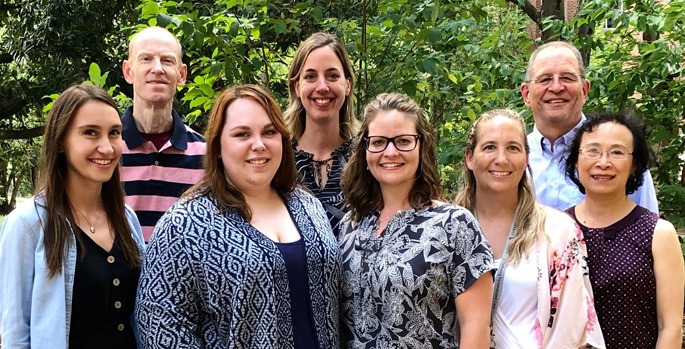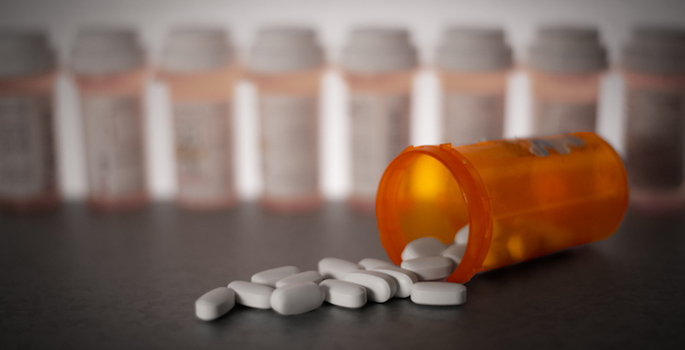Health And Medicine
-

Cellular factor helps package flu genome
New insights on influenza genome packaging could guide strategies for interfering with the virus's life cycle and ability to cause infection. Read MoreApr 8, 2020
-

VUMC team aids development of potential antiviral drug for COVID-19
Researchers at Vanderbilt University Medical Center are playing a key role in the development of a potential new antiviral drug to treat COVID-19. Read MoreApr 6, 2020
-

Triple-negative breast cancer drug therapy shows promise
Researchers from Vanderbilt-Ingram Cancer Center (VICC) discovered a role for MYCN in triple-negative breast cancer (TNBC), a particularly aggressive form of the disease, and identified a potential intervention for further clinical investigation. Read MoreMar 12, 2020
-

Loss of ‘Jedi’ alters neuron activity
This is not the Jedi you're thinking of. This Jedi is a receptor that helps clear away dead neurons during development, and its loss changes the activity of dorsal root ganglia neurons, which could have implications for treating chronic pain. Read MoreMar 10, 2020
-

Meat intake and colorectal polyps
Red and processed meat intakes are strongly associated with increased risk of sessile serrated polyps, which are not as well studied as conventional adenomas. Read MoreMar 9, 2020
-

Clues to lung injury in preterm babies
Jennifer Sucre and colleagues have discovered a factor that contributes to the pathological changes of bronchopulmonary dysplasia, the most common complication of preterm birth. Read MoreMar 5, 2020
-

One-two punch for cancer
A drug combination effectively killed aggressive blood cancers in cell and animal models; now it’s being tested in patients. Read MoreMar 5, 2020
-

Study finds certain genetic test not useful in predicting heart disease risk
A Polygenic Risk Score — a genetic assessment that doctors have hoped could predict coronary heart disease (CHD) in patients — has been found not to be a useful predictive biomarker for disease risk. Read MoreFeb 27, 2020
-

Breast cancer study may help predict treatment response
Researchers at VUMC are reporting another advance in the understanding and treatment of triple-negative breast cancer, which is particularly aggressive and difficult to treat. Read MoreFeb 27, 2020
-

Grant bolsters research on subjective cognitive decline
Katherine Gifford, PsyD, MS, assistant professor of Neurology, has been awarded a five-year, $4.3 million research grant from the National Institute on Aging to study what subjective cognitive decline can reveal about underlying pathology. Read MoreFeb 27, 2020
-

Potential new heartburn drug studied at VUMC
An investigational drug that binds bile acids in the stomach can reduce the severity of heartburn symptoms in patients with treatment-resistant gastroesophageal reflux disease (GERD) when combined with a proton pump inhibitor (PPI), a new study suggests. Read MoreFeb 26, 2020
-

Looking through MudPIT for protein interactions
The identification of novel protein interactions and sites of modification in proteins involved in mRNA translation adds to understanding of a process that is an important therapeutic target. Read MoreFeb 25, 2020
-

Reducing postoperative opioids
An opioid-restrictive prescribing protocol reduced the number of postoperative opioid prescriptions and the oral morphine equivalent per prescription. Read MoreFeb 24, 2020
-

Protein interactions and brain function
Roger Colbran and colleagues have discovered new molecular details about the function of an enzyme with a key role in shaping learning and memory. Read MoreFeb 20, 2020
-

Post-transplant diabetes may be reversible: study
Post-transplantation diabetes mellitus (PTDM), a common complication of immunosuppressive drugs that are given to prevent transplant rejection, may be reversible and at least partially preventable, researchers at VUMC report. Read MoreFeb 20, 2020
-

Transporter mutation alters cell energy
A disease-associated mutation in a transporter protein causes cells to increase energy production, as if they are starving, Vanderbilt researchers have discovered. Read MoreFeb 20, 2020
-

Vanderbilt University Medical Center among top 100 proposals for MacArthur Foundation $100 million grant
The John D. and Catherine T. MacArthur Foundation today unveiled a grant proposal from Vanderbilt University Medical Center (VUMC) as one of the highest-scoring proposals, designated as the “Top 100,” in its 100&Change competition for a single $100 million grant to help solve one of the world’s most critical societal challenges. Read MoreFeb 19, 2020
-

Barbershops targeted to improve health of black men
Black men with high blood pressure could benefit from a research study beginning this month to check their vitals while they are getting a haircut at a barbershop. Read MoreFeb 18, 2020
-

Algorithm helps improve coronary calcium detection
A new algorithm for artificial intelligence-assisted calcium scoring can accurately determine cardiovascular risk across a range of CT scans and in a racially diverse population. Read MoreFeb 13, 2020
-

A key to calcium signaling
Erkan Karakas and colleagues used cryo-electron microscopy to determine structural details of a calcium channel protein that has numerous cell signaling roles. Read MoreFeb 11, 2020